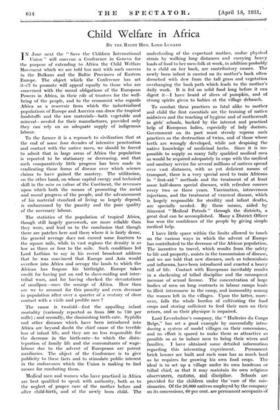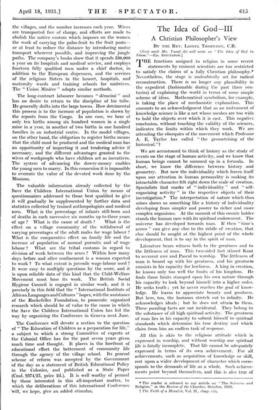Child Welfare in Africa
BY THE RIGHT HON. LORD LUGARD
IN June next the " Save the Children International Union " will convene a Conference in Geneva for the purpose of extending to Africa the Child Welfare Movement which we are told has' met with such success in the Balkans and the Baltic Provinces of Eastern Europe. The object which the Conference has set its elf to promote will appeal equally to those who are concerned with the. moral obligations of the European Powers in Africa, in their role of trustees for the well- being of the people, and to the economist who regards Africa as . a reservoir from' which the indutrialized populations of Europe and America can draw the tropical foodstuffs and the raw materials—both vegetable and mineral—needed for their manufactures, provided only they can rely on an adequate supply of indigenous labour., To the former it is a reproach to civilization that at the end Of some four decades of intensive penetration and contact with the native races, we should -be forced to admit that in large areas of Africa the population is reported to be stationary or decreasing, and that such comparatively little progress has been made in eradicating those forms of disease over which science claims to have gained the mastery. The utilitarian, on the other hand, on whose capital energy and technical skill in the anise en valeur of the Continent, the revenues upon which both the means of promoting the social and moral progress of the people, and the advancement Of his material standard of living so largely depend, is embarrassed by the pautity and the poor quality of the necessary labour.
The statistics of the population of tropical Africa, though still largely guesswork, are more reliable than they were, and lead us to the conclusion that though there are patches here and there where it is fairly dense, the general average does not exceed some fourteen to the square mile, while in vast regions the density is as low as three or four to the mile. Such conditions led Lord Lothian to say in his recent broadcast address that he was convinced that Europe and Asia would overflow into Africa and occupy the lands to which the African has forgone his birthright. Europe takes credit for having put an end to slave-raiding and inter- tribal wars, and for having checked the devastations of smallpox—once the scourge of Africa. How then are we to account for this paucity and even decrease in population after over a quarter of a century of cloSe contact with a virile and prolific race ?
The cause is twofold—first the appalling infant mortality (variously reported as from 500 to 750 per mille) ; and secondly, the diminishing birth-rate. Syphilis and other diseases which have been introduced into Africa are beyond doubt the chief cause of the terrible loss of infant life, and they are no less responsible for the decrease in the birth-rate—to which the disin- tegration of family life and the concomitants of wage- labour due to the advent of Europeans are potent auxiliaries. The object of the Conference is to give publicity to these facts and to stimulate public interest in the endeavours which the' Union is making to find means for combating them.
Medical men and women who have practised in Africa are best qualified to speak with authority, both as to the neglect of proper care of the mother before and after child-birth, and of the newly born child. The underfeeding of the expectant mother, undue physical strain by walking long distances and carrying heavy, loads of food to her men-folk at work, in addition probably to a child on her back, are contributory causes. The newly born infant is carried on its mother's back often drenched with dew from the tall grass and vegetation overhanging the bush path which leads to the mother's daily work. It is fed on solid food long before it can digest it—I have heard of slices of pumpkin, and of strong spirits given to babies at the village debauch.
To combat these practices so fatal alike to mother and child the first essentials are the training of native midwives and the teaching of hygiene and of mothercraft in girls' schools, backed by the interest and practical help of European ladies, especially of lady doctors.. Government on its part must sternly repress such practices as the destruction of twins, and of those whose teeth are wrongly developed, while not despising the native knowledge of medicinal herbs. Since it is im- possible to supply as many fully qualified medical men as would be required adequately to cope with the medical and sanitary service for several millions of natives spread over vast distances, with as yet deficient means of transport, there is a .very special need to train Africans, in " first-aid " methods and the treatment of at least some half-dozen special diseases, with refresher courses every two or three years. Vaccination, intravenous injections, and the treatment of venereal disease, which is largely responsible for sterility and infant deaths, are specially needed. By these means, aided by itinerant " Medical Patrols " through the districts, a great deal can be accomplished. Many a District Officer has won the confidence of the people by giving simple medical help.
I have little space within the limits allowed to touch on the various ways in which the advent of Europe has contributed to the decrease of the African population. The incentive to travel, which results from the safety to life and property, assists in the transmission of disease, and we are told that new diseases, such as tuberculosis and influenza, have been introduced and exacted a heavy toll of life. Contact with Europeans inevitably results in a slackening of tribal discipline and the consequent increase of sexual license. The concentration of large bodies of men on long contracts in labour camps leads to illicit intercourse in the camp, and immorality among the women left in the villages. Upon the latter, more- over, falls the whole burden of cultivating the food crops and storing sufficient to feed their men on their return, and so their physique is impaired.
Lord Leverhulme's company, the " Huileries du Congo Beige," has set a good example by successfully intro- ducing a system of model villages on their concessions, and no effort is spared to make them as attractive as possible so as to induce men to bring 'their wives and families. I have obtained some detailed information regarding this interesting experiment. Permanent brick houses are built and each man has as much land as he requires for growing his own food crops. The ideal is. to set up a village under its own headman or tribal chief, so that it may maintain its own religious observances, customs, and discipline. Schools are provided for the children under the-care of the mis- sionaries. Of the 26,000 natives employed by the company on its concessions, 60 per cent. are permanent occupants of the villages, and the number increases each year. Wives are transported free of charge, and efforts are made to abolish the native custom which imposes on the women the work of carrying the palm-fruit to the fruit posts— or at least to reduce the distance by introducing motor transport wherever possible, and improving the jungle paths. The coinpany's books show that it spends £38,000 a year 'On its hospitals and medical service, and employs fourteen fully qualified men under a chief doctor, in addition to the European dispensers, and the services: of the" religious Sisters in the lazaret, hospitals, and maternity wards and training schools for midwives. The " Union Mil iere'" adopts similar methods.
The long-contract labourer becomes " deracine " and has no desire to return to the discipline of his tribe. He generally drifts into the large towns. How detrimental this process is to the increase of population is shown by the reports from the Congo. In one case, we hear of only ten births among six hundred women in a single mine in a year, in another of two births in one hundred families in an industrial centre. In the model villages, on the other hand, the obligation to register births means that the child must be produced and the medical man has an opportunity of inspecting it and tendering advice if necessary, and the different advantages granted to the wives of workpeople who have children act as incentives. The system of advancing the dowry-money enables the young men to marry. In this connexion it is impossible to overrate the value of the devoted work done by the Missions.
What is the effect on a village community of the withdrawal of varying percentages of the adult males for wage labour ? What is the comparative effect on family life and the increase of population of normal pursuits and of wage labour ? What are the tribal customs in regard to division of work between the sexes ? Within how many days before and after confinement is a woman expected to work ? To what extent is juvenile wage-labour used ? It were easy to multiply questions by the score, and it is upon reliable data of this kind that the Child-Welfare Movement must base its work. The British Social Hygiene Council is engaged in similar work, and it is precisely in this field that the " International Institute of African Languages and Cultures " hopes, with the assistance of the Rockefeller Foundation, to prosecute organized research which should be of value to the cause in which the Save the Children International Union has led the way by organizing the Conference in Geneva next June.
The Conference will devote a section to the question of " The Education of Children as a preparation for life," a subject to which a strong Committee of experts at the Colonial Office has for the past seven years given much time and thought. It places in the forefront of educational effort the betterment of community life through the agency of the village school. Its general scheme of reform was accepted by the Government of the day as a statement of British Educational Policy in the Colonies, and published as a State Paper (Cmd. 2874/25, price 2d.). It is well worthy of perusal by those interested in this all-important matter, -to which the deliberations of this international Conference will, we hope, give an added stimulus. The valuable information already collected by the Save the Children International Union by means of questionnaires addressed to those best qualified to give it will gradually be supplemented by further data and statistics collected by trained anthropologists and medical men. What_ is the percentage _of infants still-born and of deaths in each successive six months up to three years of age ? What is the cause of death ?















































 Previous page
Previous page